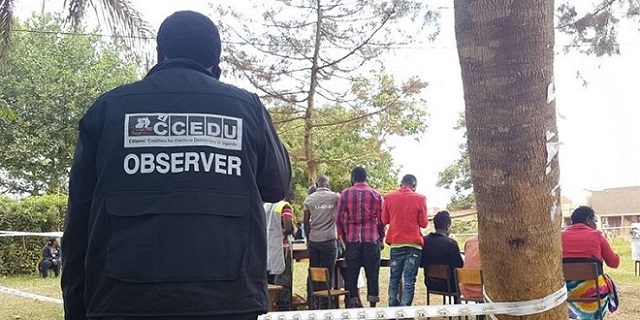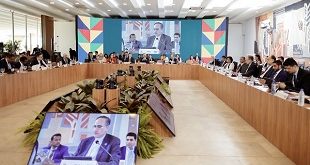
Behind the case of NGO blocked for crossing the line in election observation
Kampala, Uganda | FLAVIA NASSAKA | Since it was suspended from conducting voter education and election monitoring on July 09, a local NGO – Citizens Coalition for Electoral Democracy in Uganda (CCEDU), has been in and out meetings with the Electoral Commission in a bid to regain their freedom.
On Aug.10, they held another meeting with the hope of getting a go ahead to observe the by-election in Arua Municipality on Aug.15. But permission was denied – again.
For the CCEDU Chairman, Livingstone Sewanyana, who is the Director at another NGO; the Foundation for Human Rights Initiative, that was a sign that the EC was not about to budge. CCEDU was heading to court to challenge the EC’s move.
Sewanyana says they want court to conduct a judicial review of the decision by the EC to suspend CCEDU’s election observation license. A judicial review is a case in which the High Court reviews a decision by individuals or institutions that hold power and authority is authorized and valid or not. This means the CCEDU case has a lot of significance on the powers of the EC to determine who observes elections.
The NGO world is watching the case closely because, the EC’s withholding of CCEDU’s license is a sign of the government to scare other NGO from being critical. If the court upholds the decision, critics say, the decision could have a chilling effect and limit other NGOs from reporting election irregularities.
Sewanyana who has written a book on NGO regulation in Sub-Saharan Africa says the EC’s suspension of CCEDU’s work did not surprise them as government has always wanted to stifle freedom of Association.
“They have done this to journalists, NGOs and Political Parties. They have made sure that they have power to do so,” he said and relating it to recent raids on NGOs.
In September last year, security agencies raided and occupied the premises of three NGOs; the Great Lakes Institute for Strategic Studies (GLiSS), Uhuru Institute for Social Development in Kampala, and Solidarity Uganda in northern Uganda.
The government said it was probing reports of money laundering, and ordered another 15 NGOs to present to them a pile of documents; including annual reports and financial statements. Apart from the pressure this caused, there has not been a report of the government finding or the reasons as to why the NGO Bureau of the government was making such demands. Sewanyana says it is all part of the government’s scare tactics.
Before that, the offices of some NGOs had endured a mysterious spate of break-in and even murder of guards.
In his book titled ‘Comparative Experiences of NGO Regulatory Frameworks’, Sewanyana says, there has always been a tension between NGOs and government which he calls uneasy co-existence.
To him, the whole of Sub Saharan Africa is characterized by despotic regimes which cannot easily accept a new wave of democracy that has swept across the region.
While Election observation started as way back as the 1950s in the west, in many African nations, it is one of those relatively new phenomena that came with this democracy. In many countries in Africa, it began in the late 1980s where elections monitored by NGOs and international bodies increased.
Among the benefits that this came with, says CCEDU National Coordinator, Crispy Kaheru, is the ability of citizens and the international community to get an insight into the credibility and fairness or otherwise of elections. It also exposes areas in the election process that need strengthening for democratic practices to be entrenched in a country.
Kaheru points out that local observers like him have the benefit of understanding the local context better, including the cultures and languages. He says local observers are, therefore, able to read the undercurrents of an election better, contextualize each election better, and offer sustained, constructive feedback to election stakeholders including the election management body.
Although this could be true, experts say election observation came along with increased criticism of the behavior of authoritarian regimes which in the way also affected their relationships with the promoters of democracy from the west.
And the catch now is that for a country to benefit from foreign investment or to be members of certain international organizations they have to be seen to be democratic. This is what has helped many NGOs that do democracy promotion to thrive. But it has also meant that some governments have to push hard to muzzle critical observers.
“Dictators will enact laws that are controlling and burdensome and will not create conducive environment for inclusiveness and public participation”, Sewanyana points out. He says some advocates will censure themselves.
To understand Sewanyana’s view, many point at countries like Zimbabwe where international observers only returned this year for the July 30 general election. The previous president, Robert Mugabe, had suspended them for nearly two decades.
Groups like the European Union and the Commonwealth had been kicked out because they had reported on electoral fraud and human rights abuses during the electioneering process.
 The Independent Uganda: You get the Truth we Pay the Price
The Independent Uganda: You get the Truth we Pay the Price



